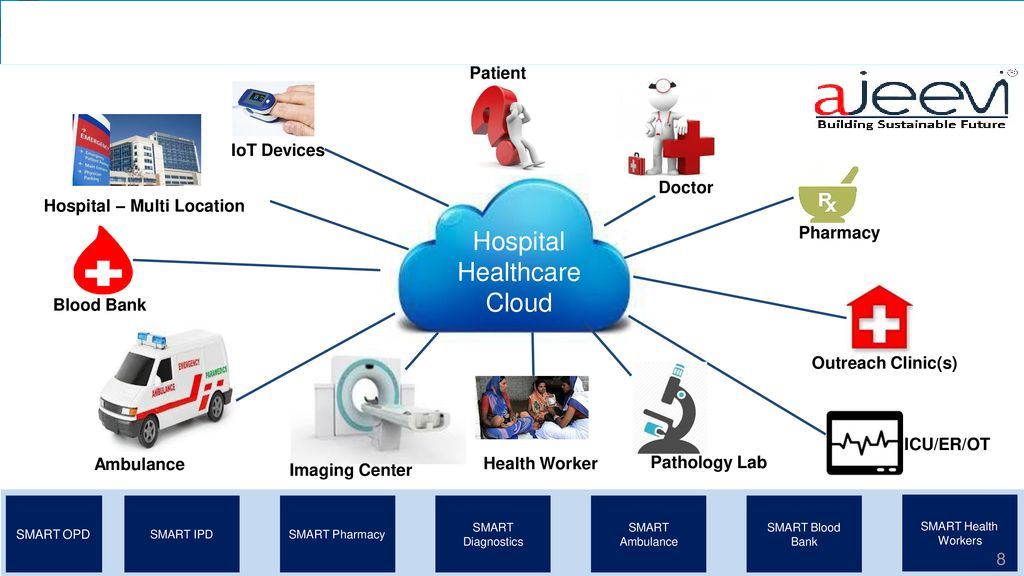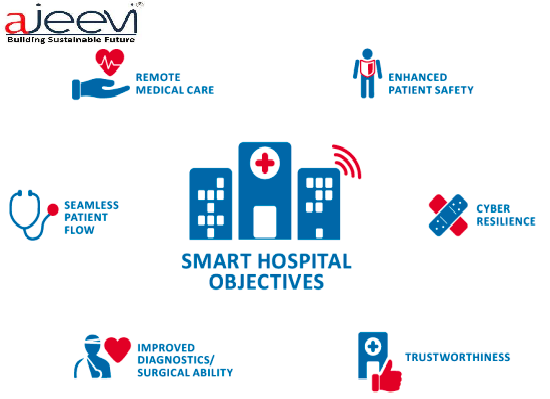Industries-> Smart Hospital



In the era of digital transformation, the concept of a smart hospital, powered by the Internet of Things (IoT), has emerged as a beacon of innovation and efficiency in the healthcare landscape. A smart hospital leverages interconnected devices, sensors, and advanced technologies to create an intelligent ecosystem that enhances patient care, optimizes operational processes, and transforms the overall healthcare experience. From real-time patient monitoring and automated data collection to predictive analytics and streamlined resource management, the integration of IoT in healthcare settings heralds a new era where technology plays a pivotal role in fostering proactive, patient-centric, and sustainable healthcare solutions.
At the heart of a smart hospital lies the seamless integration of IoT-enabled devices and systems, creating a network that transcends traditional healthcare boundaries. This interconnected infrastructure enables healthcare professionals to access real-time information, facilitating quicker and more informed decision-making. Patient outcomes are improved through continuous monitoring, personalized treatment plans, and the ability to predict and prevent health issues.
Real-time Patient Monitoring: IoT facilitates continuous monitoring of patients through connected devices and Vital signs, medication adherence, and other health metrics can be tracked in real time, allowing healthcare providers to intervene promptly and personalize treatment plans.
Smart Asset Management: IoT enables the tracking and management of medical equipment, devices, and assets within the hospital. This includes real-time location tracking, monitoring equipment usage, and automating maintenance schedules, ensuring optimal resource utilization and reducing operational costs.
Predictive Maintenance: IoT-driven predictive maintenance is employed for medical equipment. Sensors monitor the condition of machinery, predicting potential issues before they occur. This proactive approach minimizes downtime, enhances equipment longevity, and ensures the availability of critical
Automated Workflow and Resource Optimization: IoT applications streamline hospital workflows by automating routine tasks, managing patient flows, and optimizing staff assignments. This results in increased operational efficiency, reduced wait times, and a more responsive healthcare
Enhanced Patient Experience: IoT plays a key role in improving the overall patient experience. Smart devices, interactive displays, and personalized communication systems contribute to a more comfortable and engaging hospital stay. Patients can access information, control their environment, and communicate with healthcare providers
Telehealth and Remote Consultations: With IoT, smart hospitals facilitate telehealth services, allowing healthcare professionals to conduct remote consultations and monitor patients outside traditional healthcare This promotes accessibility to healthcare services and enhances patient convenience.
Security and Patient Privacy: IoT solutions in smart hospitals include robust security measures to safeguard patient data and ensure Secure communication protocols, encryption, and access controls are implemented to mitigate cybersecurity risks associated with interconnected devices.
Integration with Electronic Health Records (EHR): IoT seamlessly integrates with electronic health records, ensuring that patient data collected from various devices is consolidated and easily accessible to healthcare providers. This integration enhances care coordination and facilitates a comprehensive view of a patient’s medical history.
In conclusion, the integration of the Internet of Things (IoT) in smart hospitals marks a revolutionary leap forward in healthcare management and patient care. The multifaceted role of IoT, from real-time patient monitoring to smart asset management and predictive maintenance, creates a cohesive and responsive healthcare environment. This interconnected ecosystem not only improves the efficiency of hospital operations but also elevates the quality of patient experiences through personalized care and enhanced accessibility to healthcare services. As smart hospitals continue to harness the power of data-driven decision-making, the potential for preventive healthcare, streamlined workflows, and sustainable practices becomes increasingly evident. Despite the undeniable advancements, it is crucial to address challenges related to data security and privacy to ensure the responsible and ethical deployment of IoT in healthcare settings. As we navigate this transformative landscape, the vision of smart hospitals emerges as a beacon of innovation, promising a future where technology and compassionate healthcare converge to redefine the standards of medical excellence.


Android Handheld UHF Reader
Automatic Boom Barrier
Automatic Number Plate Reader Camera
Bin Level Sensor
Bio Metrics Machine
Bullet Camera Live
Chlorine Sensor
Data Transmission Unit
Emergency Call Box
Environment Sensor
Face Recognition
Flood Sensor
Fuel Sensor
Galvanized Iron Pole
Gi-Pole
GPS
GPS-AIS140
Handheld HF Reader
Handheld UHF Reader
PTZ Camera
Public Address Speaker
Public Address System
Hydraulic Boom Barrier
IP Bullet Camera
IRIS
Magnetic Sensor
Network Rack
Network Video Recorder
Panic Button
Parking Entry Exit UHF Reader Vehicle Mounted UHF Reader
Passenger information systems
Ph Sensor
Refrigerator Sensor
RFID Tag – HF
RFID Tag – UHF
RFID Tag Metal – UHF
Smart Kiosk
Smart Pole
Soil Sensor
Drainage Sensor
Temperature Sensor
Turbidity Sensor
Ultrasonic Flow Meter Variable Sign Board Weigh Bridge Entry Exit Reader
Ajeevi Offer “Enterprise IoT Solutions” with in-house R&D, Capability of manufacturing IOT devices.
505, Tower A-1, Corporate Park
Noida 201301, Uttar Pradesh India
presales@ajeevi.com
+91-9654323500